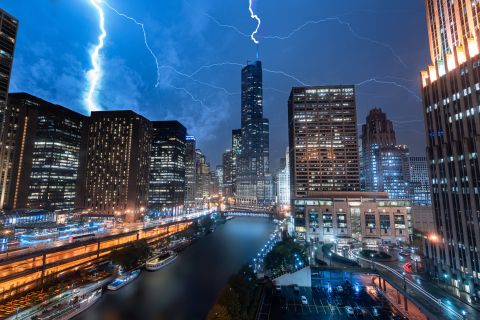Authorities in eastern China have demolished a 100-year-old temple as part of a campaign that has led to the destruction or closure of up to 1,200 places of worship, officials said Wednesday.
Officials in Shifen township near Wenzhou city in Zhejiang province told AFP the Yangshan temple was blown up on Tuesday as part of a crackdown on illegal religious activities in the area, whether Taoist, Buddhist, Protestant or Catholic.
About 1,200 temples and churches have been destroyed or closed down in Zhejiang since December last year, according to the Hong Kong-based Information Center for Human Rights and Democracy.
"The Wenzhou government decided the campaign should go ahead, because a lot of new unauthorized temples and churches have been built over the past few years, and missionary activities have been on the rise," said an official at the religious bureau in the city of Yueqing, about 40 kilometers (25 miles) from Wenzhou.
"That has created a rather chaotic situation, where some people have used religion as a pretext for superstitious activities," said the official, who gave his surname as Chen.
At the Taoist Yangshan temple, for instance, the hundreds of daily visitors were greeted by fortune tellers and mediums who claimed to be able to treat diseases and exorcise evil spirits, according to the Hong Kong-based center.
The center said seven temples had also been torn down or closed in a village near Cangnan city almost 75 kilometers (47 miles) south of Wenzhou.
While this suggests the campaign could be covering large parts of southern Zhejiang, indications are the campaign, which appears to have intensified since November, is particularly severe in Wenzhou.
In that city's Ouhai district alone, 239 unregistered religious facilities have been shut down and 210 churches and temples destroyed, an official told AFP on Tuesday.
The campaign is not only aimed at temples and other buildings, but also targets unlicensed missionaries of various faiths, Chen said.
"They'll have to be investigated, and if they pass they'll be allowed to continue their missionary activities," he said. "But in future, licensed missionaries must go to legal places of worship to preach."
China's communist government only allows organized religion to function under the control of the state and it frequently launches crackdowns against the "underground" churches, which do not recognize the state's authority.
The Hong Kong-based rights center said it was possible the central government had ordered local governments to dissolve unregistered religious groups for fear they would grow into defiant organizations such as the outlawed Falungong spiritual group.
Falungong members have continued to carry out large protests in Tiananmen Square in Beijing more than a year after the group was banned as an evil cult in July last year and its leaders were jailed for up to 18 years.
Wenzhou has a large Catholic community, which grew from the pre-communist days when foreign missionaries traveled from the main port city of Shanghai down the east coast to Wenzhou to convert the Chinese -- BEIJING (AFP)
© 2000 Al Bawaba (www.albawaba.com)








